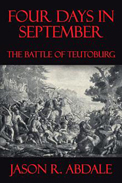
 |
It is common to read books that herald the Roman Empire's well-trained and skilled armies. This explains why almost all the famous ancient civilization personalities are Romans like Gaius Marius, Publius Cornelius, and Hannibal Barca. However, history shows from time to time that the "strong" and the "powerful" are not always what they seem. Four Days In September is one of the literatures that attest that power can come in a surprising form after a group of an underdog ancient Germanic people defeated the powerful Romans in a decisive manner.
Abdale chronicles the unbelievably successful four-day-long battle of the Germanic tribes led by Arminius against the Roman legions and auxiliaries led by Publius Quinctilius Varus. Consequently, Arminius has been highly regarded for his military leadership skills and personified as everything wild northern frontier, while Varus has taken his own life due to shame.
By using a variety of documents—analysis by modern historians and archaeological evidence—to create an accurate portrayal of the event, Abdale demonstrates the depth and breadth of The Battle of the Teutoburg. He starts the chronicle by giving a background on each civilization, Rome, and Germania, and then follows it with another sets of background on each civilization's military leader, Varus and Arminius. He does not delve on the battle and its aftermath until after the discussion on Rome's occupation of western Germania and all lands from the Rhine to the Elbe Rivers. The Romans stationed military units in these occupied Germania territories. Among the most famous of these units were the 17th, 18th, and 19th legions, who were all defeated in the Battle of Teutoburg.
Four Days In September is a compelling and informative historical account communicated in a conversational way eliminating the dull and dreary feel associated with any historical narrative.
RECOMMENDED by the US Review